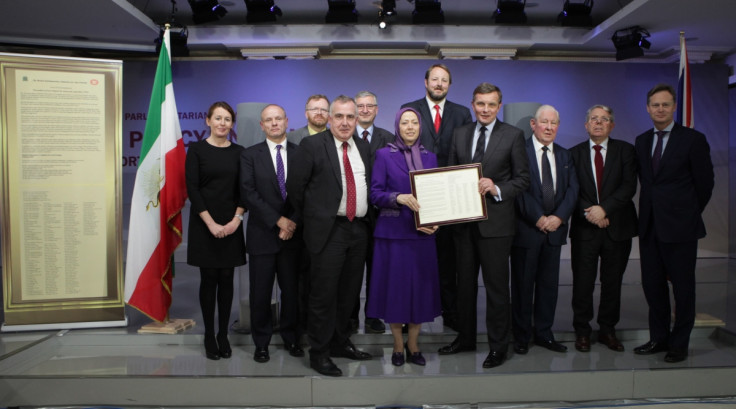Iran: UK politicians demand harder line on country's human rights record

More than 200 cross-party MPs and peers have demanded the UK government addresses Iran's human rights record, making a thawing of bilateral relations subject to such an improvement.
A policy document signed by the parliamentarians was presented to president-elect of the Iranian Resistance, Maryam Rajavi, by a delegation of eight MPs and a member of the House of Lords to the Paris headquarters of the National Council of Resistance of Iran (NCRI).
Speaking to IBTimes UK following the 12 February meeting in Paris, Conservative MP for Clwyd West David Jones said: "Today I presented a statement signed by more than 200 parliamentarians and there were eight or nine of us at the meeting in Paris. I think it was quite clear to a lot of parliamentarians that the nuclear deal was just that, and what it didn't do was address wider concerns about human rights abuses taking place in Iran.
"There have been 2,300 executions since Rouhani came to power. It is necessary to drill down and say we don't want to see a regime that doesn't respect its own citizens."
Jones added that the cessation of sanctions in Iran, following the country's compliance with International Atomic Energy Agency guidelines set in place as part of an agreed nuclear deal, would not benefit ordinary Iranians as many had thought it would. "The principal beneficiary of the new contract are the Islamic Revolutionary Guard Corps, it's not to the benefit of the Iranian people," he said.
Jim Fitzpatrick, Labour MP for Poplar and Limehouse, added: "We British MPs want the UK government to adopt a firm policy towards Iran and to support the NCRI."
The meeting and policy recommendations presented to Rajavi come several weeks before Iran's Islamic Consultative Assembly and Assembly of Experts elections, with the latter responsible for choosing and supervising the Supreme Leader of Iran.
During the meeting, Rajavi said: "Some apologists claim that after the nuclear agreement, the Iranian regime would move towards moderation. Yet, we can see that the situation is otherwise: Human rights abuses in Iran have worsened after the nuclear deal, as has the mullahs' meddling and aggression in Syria".
"If this religious fascism were not in power in Iran, we would not have a shattered Iraq today with all its painful tragedies. Likewise, in Syria, there would not have been this violent war and genocide and Yemen would not have been turned into a killing-field by the regime's agents."
The British Parliamentary Committee for Iran Freedom's policy document read: "First, human rights must be a central factor in our relations with Iran. Human rights cannot be decoupled from the nuclear discussions. We must make it clear to rulers of Iran that their behaviour towards their own people is unacceptable. We must not turn a blind eye to the grave violation of human rights in Iran. On the contrary, expressions of concern about the human rights situation in Iran must be a priority in any bilateral relationship.
"Second, regarding the nuclear issue, the Iranian regime should provide unfettered "anytime, anywhere" access to all the sites, military and non-military and to all its nuclear scientists. It should relieve all the concerns about the possible military dimensions of its nuclear programme, pertaining to the present or the past, prior to any sanctions relief. There should be zero tolerance for any infringement of the nuclear agreement by Tehran.
"Third, we should support our allies in the region to stand up against Iran's growing meddling. Iran has been and remains the source of instability in the region. Fourth, we need to engage with Iran's democratic opposition, the National Council of Resistance of Iran. We fully support the ten-point platform of Mrs Maryam Rajavi calling for a democratic and non-nuclear Iran with separation of religion and state, gender equality and elimination of all religious and ethnic discrimination."
The cross-party delegation, which included Lord Clarke of Hampstead and MPs Mark Williams, Sir Alan Meale, Martyn Day, Jim Fitzpatrick, Toby Perkins, and Mike Freer, also expressed support for the members of the PMOI at Camp Liberty, Iraq, and urged the UK and US governments as well as the UN Security Council to guarantee the safety and security of the Camp Liberty residents until departure of all of them from Iraq.
© Copyright IBTimes 2025. All rights reserved.






















